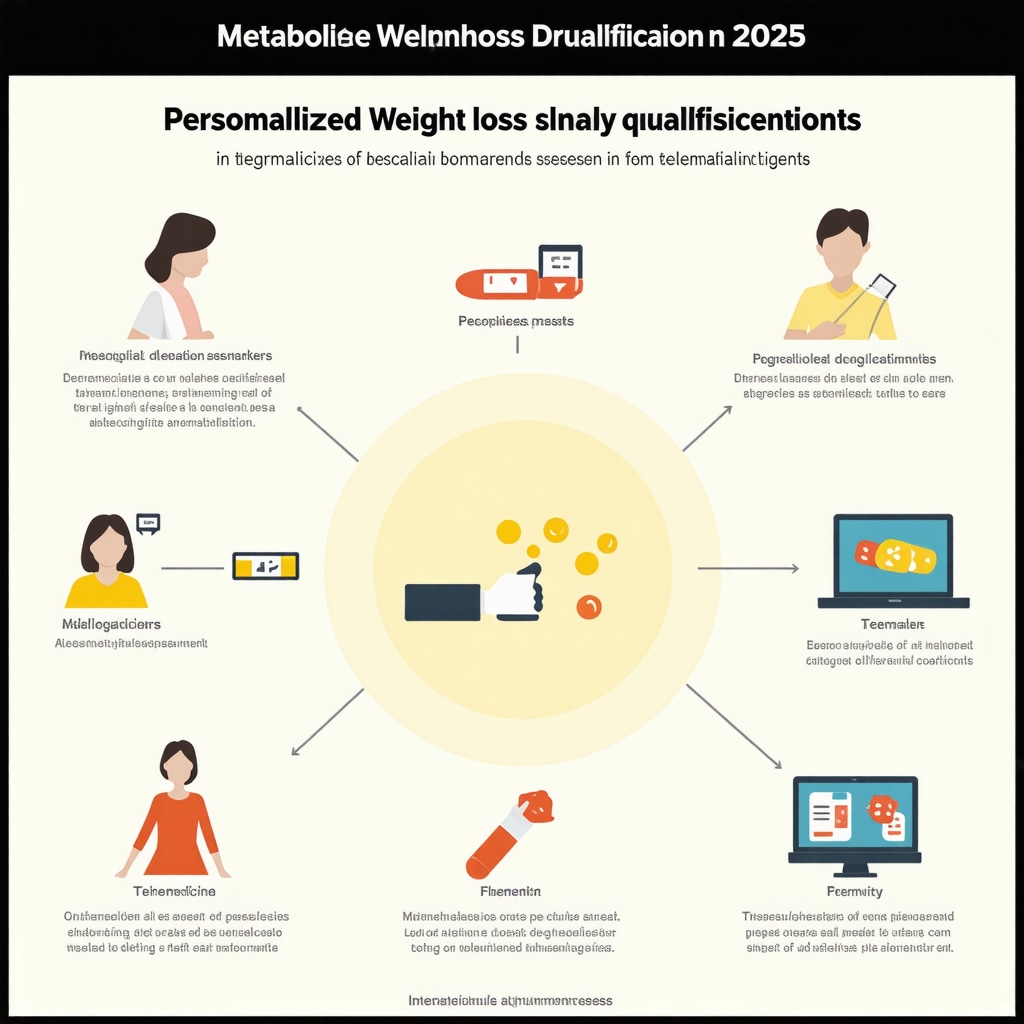Unlocking the Weight Loss Drug Door: What It Really Takes in 2025
Imagine standing in front of a locked door labeled “Weight Loss Success”—and the key is a prescription for weight loss drugs. But not everyone gets the key handed over freely. In 2025, qualifying for these medications isn’t just about wanting to shed pounds; it’s a carefully navigated medical journey. So, how do you actually qualify for weight loss drugs? Strap in as we break down the steps with the savvy of a seasoned columnist who’s seen the twists and turns of this evolving landscape.
Step 1: Know the Numbers—BMI Isn’t Just a Number, It’s a Gatekeeper
Doctors often start by looking at your Body Mass Index (BMI). Generally, a BMI of 30 or more qualifies you as obese, opening the door to prescription weight loss treatments. If your BMI is between 27 and 29.9, you might still qualify if you have weight-related health conditions like type 2 diabetes or hypertension. This isn’t just bureaucratic red tape; it’s about safety and ensuring medications are prescribed where benefits outweigh risks.
Is It Just About BMI, or Is There More to the Story?
Great question! While BMI is the headline, doctors dig deeper. They evaluate your medical history, lifestyle, and previous attempts at weight loss. Have you tried diet and exercise without lasting results? Are there underlying issues like metabolic disorders? This comprehensive assessment ensures that weight loss drugs are part of a tailored plan—not a quick fix.
Step 2: Consult a Weight Loss Specialist or Your Primary Care Physician
Next, you’ll want to seek professional guidance. A healthcare provider can evaluate whether prescription weight loss drugs are suitable for you. Many clinics offer doctor-led fat loss plans that combine medication with lifestyle coaching, improving your chances of success. Transparency here is key—be honest about your health, habits, and goals.
Step 3: Understand the Medication Landscape—From Semaglutide to New FDA Approvals
The weight loss medication market is buzzing with innovations. Drugs like semaglutide and tirzepatide have reshaped obesity treatment, but qualifying for them involves meeting specific criteria due to their potency and cost. If you’re curious about how these drugs stack up, check out the ultimate weight loss showdown. Your doctor will help determine which option fits your health profile best.
Step 4: Prepare for the Paperwork and Follow-Up
Once you qualify, don’t expect the journey to end there. Weight loss drugs require ongoing monitoring—think of it as a partnership between you and your healthcare provider. Regular check-ins evaluate effectiveness and manage side effects. Plus, insurance approval can be a hurdle, so understanding your coverage is crucial.
Want to Take the First Step Today?
If this sounds like the right path for you, why not start by exploring how to qualify for prescription weight loss medications with expert guidance? Visit this comprehensive guide that walks you through eligibility and next steps. Remember, every journey begins with that first, informed step.
According to the CDC’s adult obesity statistics, nearly 42% of adults in the United States are affected by obesity, underscoring how vital safe and effective weight loss interventions have become in 2025.
So, what’s your story? Have you tried qualifying for weight loss drugs before? Drop your thoughts and experiences in the comments below—we’re all in this together.
Why Personalized Medical Evaluation Is the Game Changer in Weight Loss Drug Qualification
Beyond BMI and initial screening, one of the most critical factors in qualifying for weight loss drugs in 2025 is a detailed, personalized medical evaluation. This assessment includes metabolic panels, hormone levels, and an exploration of psychological factors that influence eating behaviors. Doctors are increasingly aware that obesity is a multifaceted condition involving biology, psychology, and environment, which is why a cookie-cutter approach no longer suffices.
For instance, conditions such as hypothyroidism or insulin resistance can complicate weight loss efforts and may affect eligibility or choice of medication. This tailored approach is highlighted in doctor-led fat loss plans, which integrate medical expertise with lifestyle modifications for sustainable results.
Insurance and Accessibility: The Invisible Hurdles to Weight Loss Medication
Even after meeting medical criteria, patients often face the challenge of insurance coverage. Many plans have strict policies requiring documented previous weight loss attempts and sometimes mandate prior authorization, which can delay treatment. This bureaucratic maze means that understanding your insurance policy and working closely with healthcare providers to navigate paperwork is essential.
Fortunately, telemedicine has emerged as a powerful tool to enhance access. Platforms offering telemedicine weight loss treatment allow patients to consult specialists remotely, speeding up evaluation and prescription access while maintaining personalized care.
How Do Doctors Decide Which Weight Loss Drug Is Right for You?
Choosing the right medication involves more than just ticking qualification boxes; it’s a clinical decision balancing efficacy, safety, and patient-specific factors. For example, semaglutide and tirzepatide, two leading FDA-approved drugs, differ in mechanism and side effect profiles. Doctors consider your medical history, potential benefits, and risks alongside your lifestyle and preferences.
Emerging research, such as a comparative analysis published by the National Center for Biotechnology Information (NCBI), provides valuable insights into how these medications perform in diverse populations. This evidence-based approach ensures patients receive the most appropriate treatment tailored to their unique circumstances.
Integrating Medication with Lifestyle: The Cornerstone of Lasting Success
Qualifying for weight loss drugs is just the start. Sustainable weight management requires integrating medication with dietary changes, physical activity, and behavioral therapy. Clinics offering doctor-prescribed weight loss plans emphasize this holistic strategy. This multidisciplinary approach not only maximizes fat loss but also improves metabolic health and reduces the risk of comorbidities.
Regular follow-ups allow healthcare providers to adjust treatment plans, monitor side effects, and provide motivation—making the journey collaborative and adaptive.
What’s Your Experience with Prescription Weight Loss Medications?
Have you navigated the qualification process or started on prescription weight loss drugs? Your insights and questions enrich this conversation. Share your story or ask your burning questions in the comments below. And if you’re ready to dive deeper into the qualifications and options available, explore our detailed guide on qualifying for prescription weight loss medications. Together, we can demystify this complex but promising field.
Decoding Complex Medical Profiles: Beyond the Surface of Weight Loss Drug Eligibility
In the nuanced world of 2025 weight loss drug qualification, it’s no longer sufficient to rely solely on BMI and basic health metrics. Cutting-edge evaluations now incorporate advanced metabolic assessments such as resting energy expenditure measurements and detailed hormonal panels. These tests reveal metabolic adaptations that often sabotage weight loss attempts, such as leptin resistance or altered ghrelin secretion patterns. Understanding these physiological intricacies empowers clinicians to tailor pharmacotherapy precisely, optimizing outcomes while minimizing adverse effects.
Moreover, psychological assessments evaluating eating behaviors—like emotional or binge eating tendencies—are becoming integral. These behavioral phenotypes influence not only the choice of medication but also the adjunctive behavioral therapies prescribed. The intersection of endocrinology and psychology here epitomizes the multidimensional care necessary for true success.
How Do Emerging Biomarkers Influence Weight Loss Drug Suitability and Dosing?
Emerging research highlights biomarkers such as adiponectin levels and inflammatory cytokines as predictive tools for drug responsiveness. For instance, elevated C-reactive protein (CRP) levels may correlate with poorer outcomes on certain GLP-1 receptor agonists, prompting clinicians to consider alternative agents or combination therapies. Additionally, pharmacogenomic testing is slowly entering clinical practice, potentially informing dosing strategies and minimizing side effects based on individual genetic profiles.
Such precision medicine approaches are backed by findings published in the Journal of Clinical Endocrinology & Metabolism, underscoring the potential for biomarker-driven treatment paradigms to revolutionize obesity pharmacotherapy.
Overcoming Real-World Barriers: Insurance Nuances, Socioeconomic Factors, and Telehealth Innovations
While clinical eligibility is paramount, the labyrinth of insurance approvals remains a formidable barrier. Beyond prior authorization, many insurers impose step therapy protocols, requiring patients to try and fail cheaper medications or lifestyle interventions before covering newer, more effective drugs. This can delay optimal treatment and diminish motivation.
Socioeconomic determinants also profoundly affect access. Patients in underserved areas may lack specialists or supportive infrastructure for comprehensive care. Here, telemedicine emerges as a democratizing force. Remote consultations and digital behavioral coaching platforms are not just conveniences; they are lifelines that provide equitable access to expert-guided weight management strategies.
Clinics pioneering telemedicine weight loss treatment are demonstrating improved adherence and outcomes, especially when combining medication with continuous virtual support. This synergy is critical in bridging the gap between eligibility and successful long-term weight loss.
Integrating Advanced Pharmacotherapy with Precision Lifestyle Modifications: The Future of Sustainable Weight Management
True mastery in weight loss drug qualification and treatment lies in harmonizing pharmacologic advances with personalized lifestyle interventions. Cutting-edge programs employ continuous glucose monitoring and wearable fitness technologies to provide real-time data, allowing for dynamic adjustment of diet, exercise, and medication dosing.
This feedback loop fosters heightened patient engagement and empowers clinicians to preemptively address plateaus or side effects. Multidisciplinary teams—including endocrinologists, dietitians, behavioral therapists, and exercise physiologists—collaborate seamlessly, embodying a new standard of care that transcends traditional siloed approaches.
As this integrated model gains traction, it promises not only improved weight loss but also meaningful reductions in obesity-related comorbidities, transforming patient lives on multiple levels.

What Are the Most Effective Strategies to Navigate Complex Qualification Criteria for Weight Loss Medications?
Navigating the intricate qualification landscape requires proactive, informed strategies. Patients benefit immensely from detailed medical documentation of prior weight loss efforts, comprehensive health evaluations, and open communication with providers about all relevant health factors. Engaging with specialists who understand the evolving pharmacotherapy landscape ensures that candidates are optimally prepared for the approval process.
Additionally, leveraging resources like patient advocacy groups and updated clinical guidelines can provide critical support. Clinicians must stay abreast of emerging evidence and regulatory changes to advocate effectively for their patients, ensuring access to the most appropriate therapies.
If you’re ready to deepen your understanding and explore personalized pathways to qualifying for weight loss drugs, visit our comprehensive expert guide—your roadmap to informed, strategic engagement with this complex yet promising facet of weight management.
Decoding the Nuances: How Advanced Clinical Profiles Shape Weight Loss Drug Eligibility
As we traverse deeper into 2025, the qualification criteria for weight loss medications have evolved into a sophisticated interplay of clinical insights and personalized medicine. Beyond the familiar BMI thresholds and comorbidity checklists, physicians now leverage comprehensive metabolic and behavioral profiling to tailor treatment plans uniquely suited to each patient.
These advanced evaluations capture subtle physiological markers such as resting metabolic rate variations, leptin and ghrelin hormone imbalances, and even inflammatory biomarkers like C-reactive protein (CRP) that can significantly influence drug responsiveness. This precision approach not only refines eligibility but also optimizes medication selection and dosing strategies, aligning with the patient’s biological and psychological landscape.
For a deeper dive into medical assessments integrated with lifestyle interventions, explore our doctor-led fat loss plans that exemplify this cutting-edge methodology.
What Role Do Emerging Biomarkers and Pharmacogenomics Play in Tailoring Weight Loss Treatments?
The burgeoning field of biomarker research is reshaping how clinicians predict and enhance weight loss drug efficacy. Biomarkers such as adiponectin levels, inflammatory cytokines, and genetic polymorphisms are increasingly recognized as pivotal in forecasting patient-specific responses to GLP-1 receptor agonists like semaglutide and tirzepatide.
Pharmacogenomic profiling, although still emerging in routine clinical practice, promises a future where dosing and medication choice are fine-tuned based on genetic predispositions, minimizing adverse effects while maximizing therapeutic benefit. These advances stem from robust studies, including analyses published by the American Journal of Clinical Nutrition, underscoring the transformational potential of integrating genomics into obesity pharmacotherapy.
Bridging Accessibility Gaps: Insurance Complexities and Telehealth as a Catalyst for Inclusion
Even with medical eligibility in hand, the journey toward weight loss medication access often encounters formidable insurance barriers. Step therapy mandates, prior authorization delays, and socioeconomic disparities create a challenging terrain for many patients.
However, telemedicine platforms have emerged as vital conduits for democratizing access, facilitating timely specialist consultations and streamlining prescription processes. Clinics embracing telemedicine weight loss treatment report enhanced adherence and patient satisfaction, particularly in underserved populations where conventional healthcare infrastructure is limited.
Personalized Integration: Why Medication Alone Isn’t Enough for Sustainable Weight Management
Experts emphasize that pharmacotherapy should never be a standalone solution. Weight loss drugs yield the best outcomes when embedded within a comprehensive, multidisciplinary framework encompassing nutritional counseling, physical activity guidance, and behavioral therapies.
Our doctor-prescribed weight loss plans illustrate this holistic philosophy, ensuring that patients receive continuous, adaptive support throughout their weight loss journey, ultimately fostering durable and healthful results.
How Can Patients and Providers Collaborate to Navigate Complex Qualification and Optimize Outcomes?
Effective navigation of the intricate qualification landscape demands proactive, transparent communication and meticulous documentation. Patients benefit from maintaining detailed records of prior weight management efforts and openly discussing all health facets with their healthcare team. Providers, in turn, must stay abreast of evolving clinical guidelines and leverage emerging evidence to advocate for patient access to the most appropriate pharmacotherapies.
Engaging with specialized practitioners who offer tailored, evidence-based approaches—like those outlined in our comprehensive qualification guide—can transform what once seemed like a daunting process into a structured, attainable plan.
Your experiences and insights enrich this evolving conversation. Share your journey or questions below, and let’s advance together toward informed, empowered weight management in 2025 and beyond.

Expert Insights & Advanced Considerations
The Critical Role of Metabolic and Behavioral Profiling in Eligibility
Beyond traditional BMI thresholds, advanced clinical assessments such as resting metabolic rate analysis and psychological evaluations are redefining qualification for weight loss drugs. These insights allow clinicians to identify metabolic adaptations and behavioral patterns like leptin resistance or emotional eating, facilitating personalized pharmacotherapy that maximizes efficacy and minimizes side effects.
Insurance Navigation Requires Strategic Documentation and Advocacy
Understanding the intricacies of insurance policies—including prior authorization and step therapy protocols—is essential for timely access to medications. Patients and providers who meticulously document previous weight loss efforts and engage in proactive communication can better overcome these systemic barriers, accelerating treatment initiation.
Telemedicine as a Catalyst for Equitable Access and Continuous Support
Telehealth platforms have transformed the landscape by providing remote specialist consultations and ongoing behavioral coaching. This innovation not only expands access for underserved populations but also fosters improved adherence through continuous virtual engagement, complementing medication with personalized lifestyle support.
Pharmacogenomics and Emerging Biomarkers: The Future of Tailored Therapy
Emerging research into genetic markers and inflammatory cytokines offers promising avenues for customizing drug choice and dosing. While still in early clinical adoption, these precision medicine tools are poised to optimize outcomes by predicting individual responsiveness and reducing adverse reactions.
Holistic Integration of Medication with Multidisciplinary Lifestyle Interventions
Successful long-term weight management hinges on combining pharmacotherapy with nutritional guidance, physical activity, and behavioral therapy. Multidisciplinary teams ensure treatment plans are adaptive and patient-centered, enhancing sustainable fat loss and metabolic health improvements.
Curated Expert Resources
- National Center for Biotechnology Information (NCBI) – Offers comprehensive research articles on obesity pharmacotherapy, biomarker studies, and clinical trial data essential for evidence-based treatment decisions.
- CDC Adult Obesity Data – Provides up-to-date statistics and epidemiological insights critical for understanding population-level obesity trends and informing public health strategies.
- Doctor-Led Fat Loss Plans (link) – A resource showcasing integrated medical and lifestyle approaches tailored for effective and safe weight loss.
- Telemedicine Weight Loss Treatment Platforms (link) – Facilitates remote access to expert consultations and streamlined prescription processes, enhancing patient adherence.
- FDA-Approved Weight Loss Medication Comparisons (link) – Detailed analyses to help clinicians and patients choose the most appropriate GLP-1 receptor agonist based on individual profiles.
Final Expert Perspective
Qualifying for weight loss drugs in 2025 is no longer a straightforward checklist exercise but a nuanced, multifaceted process that demands a deep understanding of metabolic, psychological, and socioeconomic factors. The integration of advanced diagnostics, personalized medicine, and innovative telehealth solutions is reshaping how patients gain access to effective obesity pharmacotherapy. Embracing a holistic, evidence-based approach not only enhances eligibility but also ensures sustained success.
For those ready to navigate this complex terrain with expert guidance, exploring comprehensive qualification strategies and engaging with multidisciplinary care teams is the way forward. Share your professional experiences or questions, and let’s continue advancing the conversation toward truly transformative weight management solutions.

This article really highlights how multifaceted the process of qualifying for weight loss medications has become in 2025. I appreciate the emphasis on personalized medical evaluations, especially incorporating hormonal panels and psychological assessments. In my experience, focusing solely on BMI can overlook underlying issues like insulin resistance or emotional eating patterns, which significantly impact treatment success. I’ve seen patients benefit most when their care plans address both biological and behavioral factors simultaneously. It made me think, how often are clinicians integrating advanced biomarker testing into routine evaluations now? Are some clinics still primarily relying on traditional screening methods, or is this becoming the standard? It would be interesting to hear how others are navigating these complex assessments and whether they’ve noticed better outcomes using this tailored approach.
This really resonated with me, especially the part about comprehensive evaluations beyond BMI—I’ve encountered situations where patients with similar weight profiles respond very differently to medications, likely due to underlying hormonal or metabolic variances. The evolving role of biomarkers and pharmacogenomics seems promising for truly personalized treatments. However, I wonder about the accessibility of these advanced diagnostics in everyday clinical practice. Are smaller clinics able to implement such thorough assessments without significant costs? Also, how do insurance policies adapt to cover these new testing modalities? It seems like a game-changer, but the practical barriers might slow widespread adoption. For those of you working in different settings, have you seen a shift towards integrating these evaluations, or is there still a reliance on traditional screening methods? I’d love to hear how others are navigating this landscape and making personalized medicine feasible for more patients.